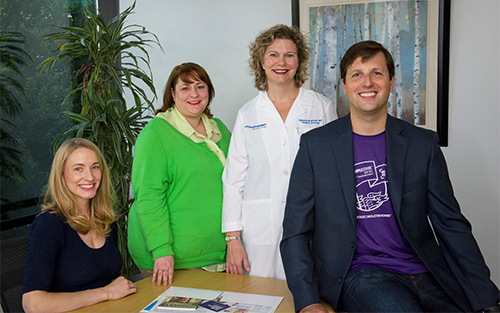
Caption here
We recently had time to speak with Rebecca Minter, MD, a professor and the Alvin Baldwin Jr. Chair in the Department of Surgery at University of Southwestern Medical Center about their new pancreatic cancer programs, in collaboration with our Dallas-Fort Worth Affiliate.

L-R: Kelley Wissinger, MPH, RD; Catherine Credeur, LMSW, OSW-C, Rebecca Minter, MD; Zach Weismann.
What was the motivation behind launching UTSW’s new pancreatic cancer programs? And, how does it create better outcomes for pancreatic cancer patients?
I have had to tell patients far too many times, “I’m very sorry to have to tell you this, but we believe the mass in your pancreas is cancer.” The phases of shock, grieving, and hope that I see patients experience varies widely. Most often, it is highly dependent on the information and support that they receive as they move through their journey with this difficult disease.
When we launched our two new multi-disciplinary pancreatic cancer programs at UT Southwestern, we sought to directly embed the Pancreatic Cancer Action Network’s resources within our clinical programs.
We strongly believe that the ability to find a cure and to develop platforms to support early detection for patients at risk for developing pancreatic cancer rests in our ability to collaborate. The opportunity to work with the Pancreatic Cancer Action Network in the development of our pancreatic cancer programs has allowed us to develop them in a truly patient and caregiver-centered manner, and has directly benefitted patients and their families. We hope this can be a model for other centers who wish to directly embed the Pancreatic Cancer Action Network’s excellent resources and volunteers into their multi-disciplinary pancreatic cancer programs.
How has our volunteer network helped to initiate your novel approach?
With the assistance of Zach Weismann, Affiliate Chair of the Dallas-Fort Worth Affiliate, we embarked on developing a patient and caregiver lunch session featuring our Multi-Disciplinary Pancreatic Cancer Program, with the direct support of your local volunteers.
The session was developed to provide patients, their caregivers and families with access to the full array of supportive services that the Simmons Comprehensive Cancer Center and the Pancreatic Cancer Action Network can give, recognizing the exponential power of these complementary services and offerings. The Dallas-Fort Worth Affiliate volunteers attend the sessions to offer additional support, information and hope to attendees.
What are the goals of these programs?
The goal of the Multi-Disciplinary Pancreatic Cancer Program is to provide patients with a highly coordinated single-day visit with all necessary specialists and completion of testing so that they will have a treatment plan by the end of the day. During their visit, the patient and caregiver lunch session occurs and researchers and doctors meet for a multi-disciplinary tumor board where individual patient cases are discussed.
The Pancreatic Cancer Prevention Program is designed to provide hope to patients and their families who are at increased risk for the disease.
How has the Pancreatic Cancer Action Network’s patient services impacted your program?
Patients struggle with the information overload on the internet and sometimes competing interests in seeking out the best possible medical care. I have long referred my patients to the Pancreatic Cancer Action Network. Your patient services provides a balanced perspective; valuable resources and access to other patients and families who have experienced this disease first-hand.
We have been able to provide patients with access to the organization’s educational resources, as well as “crowd-sourced” resources that some of our Dallas-Fort Worth patients and families have found useful in their personal journeys.
The Clinical Trial Finder is also particularly helpful to patients and families in navigating the myriad of trials available and determining, which options may apply to their particular case.
What has been the response so far to your Multi-Disciplinary Pancreatic Cancer Program?
One patient expressed so aptly, “Prior to today I felt so isolated, so alone, and now I have met so many others who are going through the same thing that I am. I feel like I know where to go now for help and information.”
The ability for patients to directly meet a Pancreatic Cancer Action Network volunteer, as well as talk with other patients and their families during their visit to the program has been very powerful.
The opinions expressed are those of the physician and do not reflect the official positions of UT Southwestern Medical Center. For additional information about the Simmons Comprehensive Cancer Center please contact, Rebecca Minter, MD at rebecca.minter@utsouthwestern.edu.
For more information about our one-on-one personalized support and resources –including clinical trials searches, educational materials and our Survivor and Caregiver Network – contact PanCAN Patient Services at 877-272-6226 or by completing our contact form.





